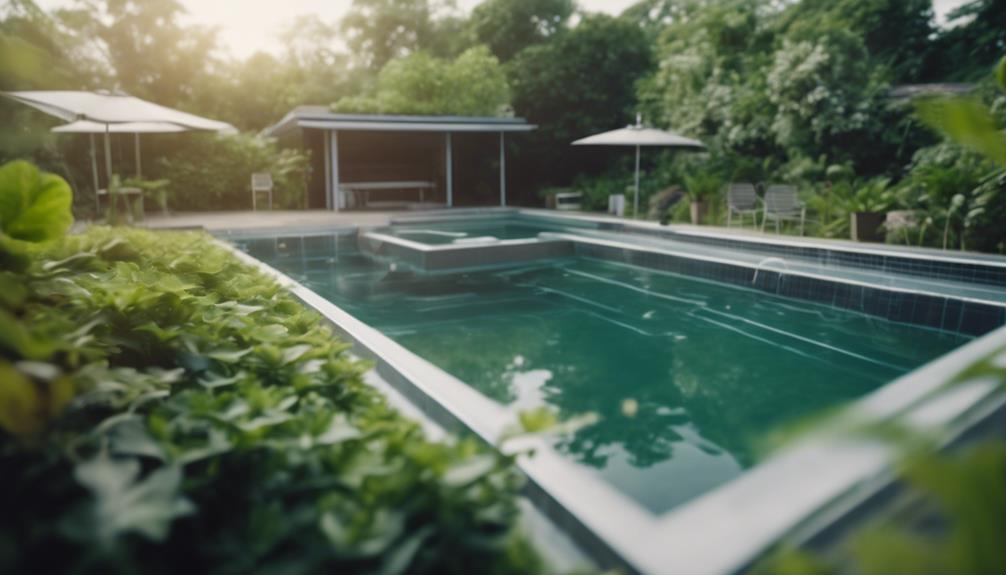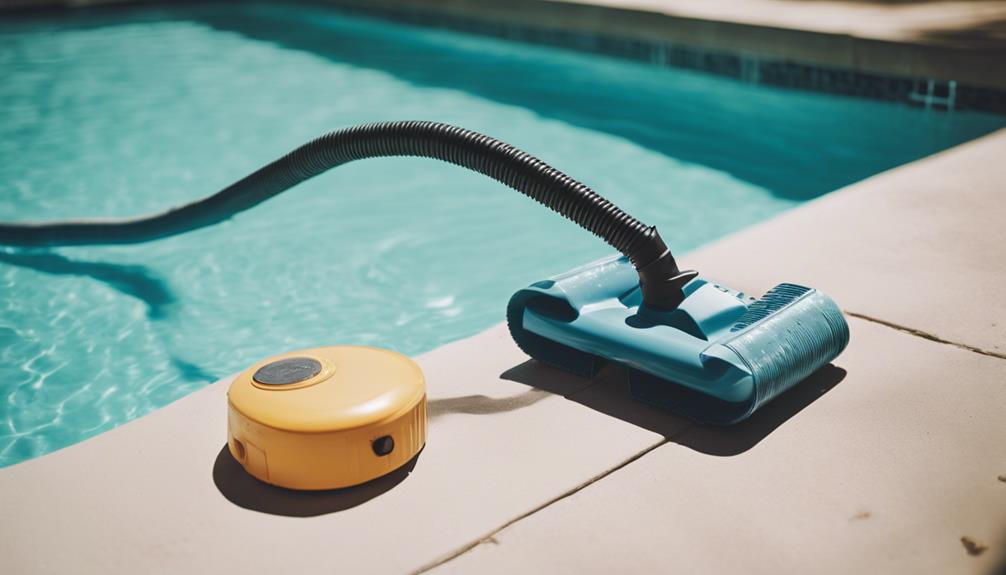When looking to create environmentally friendly swimming pools, consider opting for high-tech eco pools featuring salt chlorination and natural stone aesthetics. Embrace natural bio pools for a chemical-free water treatment solution and a sustainable swimming experience. Explore eco-friendly filtration systems that utilize aquatic plants to help reduce water consumption. Prioritize sustainable pool construction techniques that involve recycled materials and solar heating for improved energy efficiency. Look into saltwater pools and wetland systems as alternative options that require minimal chemical use and promote a balanced ecosystem. By incorporating eco zones with plants, you can create a cleaner and more sustainable pool environment. Discover the most environmentally friendly pool options by making these green choices.
Key Takeaways
- Utilize natural bio pools with chemical-free water treatment for eco-friendly swimming.
- Opt for sustainable pool construction methods using recycled materials and energy-efficient equipment.
- Consider saltwater pools and wetland systems to reduce chemical reliance and promote sustainability.
- Incorporate plants for pool sustainability, acting as natural filtration systems.
- Choose solar heating solutions for pools to harness solar energy and reduce carbon footprint.
High-Tech Eco Pools
High-tech eco pools revolutionize traditional pool maintenance methods by incorporating advanced technologies for a more sustainable and enjoyable swimming experience. These pools utilize salt chlorination, UV radiation, and ozone treatment to keep the water clean and safe without the need for storing chemicals.
By neutralizing microorganisms and producing oxygen, high-tech eco pools create a healthier environment for swimmers, reducing irritation to eyes, skin, and mucosa membranes.
In addition to their cleaner and safer qualities, high-tech eco pools also offer aesthetic appeal with natural stone options, blending seamlessly into different landscapes. Their design not only enhances the overall visual experience but also requires less maintenance, making them a cost-effective and eco-friendly choice for pool owners.
Compared to traditional pools, high-tech eco pools have minimal environmental impact and conserve water by utilizing 35% less for filter cleansing, making them a smart and sustainable option for those seeking a greener swimming solution.
Natural Bio Pool Benefits
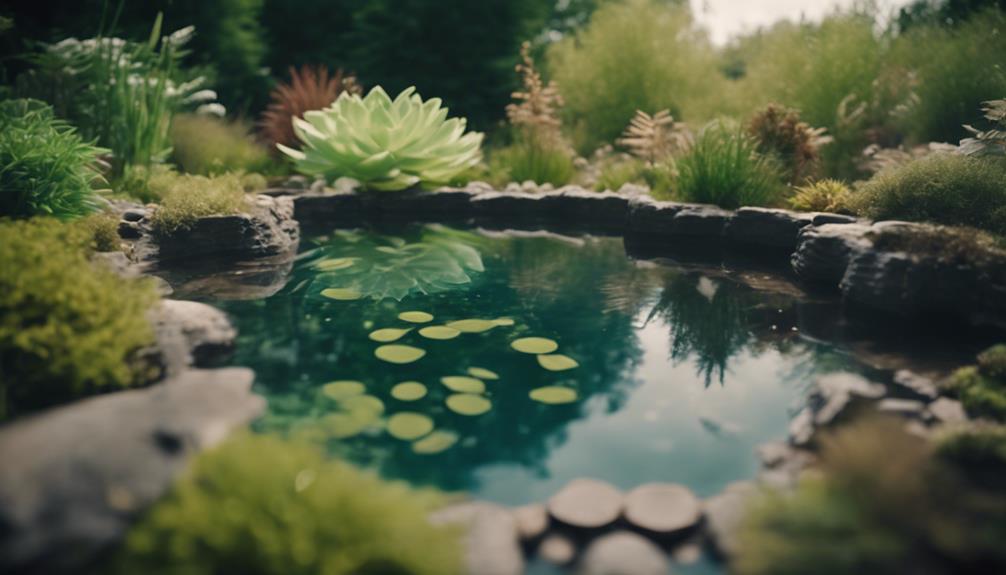
Natural bio pools offer a chemical-free water treatment alternative that uses eco-friendly filtration systems. These pools are designed to mimic natural ecosystems and are easy to maintain. They promote biodiversity and conserve water. With clear, skin-friendly waters and minimal environmental impact, natural bio pools provide a visually appealing and sustainable option for your swimming needs.
Eco-Friendly Filtration Systems
By harnessing the power of aquatic plants and biological filters, eco-friendly bio pools guarantee water purification without relying on chemicals. These natural swimming pools offer a chemical-free alternative to traditional pools, using a combination of aquatic plants and biological filters to mimic natural ecosystems for water purification.
The beauty of bio pools lies in their low-tech maintenance requirements and eco-friendly approach to keeping water clean and safe for swimming. Not only do bio pools reduce water consumption by up to 35% compared to conventional pools, but they also enhance visual appeal with natural stone designs while preserving biodiversity.
With little to no environmental impact, eco-friendly bio pools are an excellent choice for those looking to enjoy a swimming pool while minimizing their carbon footprint. The combination of aquatic plants and biological filters guarantees that water remains crystal clear and free from harmful chemicals, making bio pools a sustainable and environmentally conscious option for your backyard oasis.
Chemical-Free Water Treatment
Using a combination of aquatic plants and biological filters, bio pools offer a chemical-free solution for water treatment, ensuring a safe and eco-friendly swimming experience. These natural pools function by replicating ecosystems found in nature, relying on the interactions between plants and filters to keep the water clean without the need for harsh chemicals. By reducing the dependence on traditional pool treatments that can be harmful to the environment, bio pools provide a sustainable alternative that promotes biodiversity.
Aquatic plants play an essential role in bio pools by acting as natural filters that remove impurities and maintain water quality. This process not only creates a healthier swimming environment but also supports the growth of various organisms, contributing to the overall ecosystem balance.
The chemical-free water treatment employed in bio pools isn't only environmentally friendly but also safe for swimmers, making it an attractive option for those seeking a more natural and sustainable swimming experience.
Sustainable Pool Construction Methods
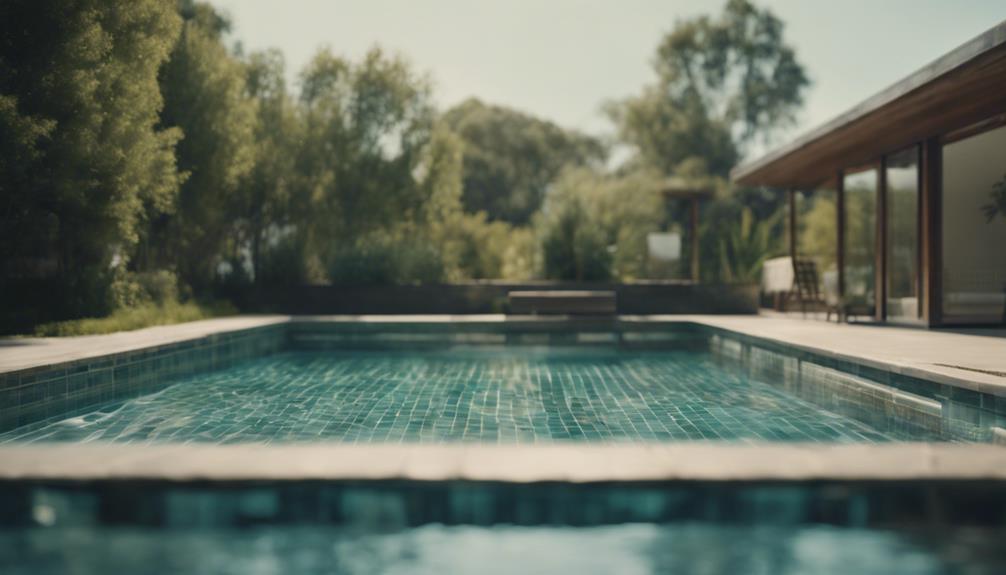
When constructing an eco-friendly swimming pool, focus on utilizing sustainable materials and practices to minimize environmental impact. Here are three key elements to keep in mind for sustainable pool construction:
- Incorporate Recycled Materials:
Opt for materials like recycled glass or rubber for pool decking and pathways. Using recycled materials helps reduce waste and lessens the demand for new resources, making your pool construction more eco-friendly.
- Utilize Energy-Efficient Equipment:
Choose energy-efficient pumps, heaters, and lighting systems to lower energy consumption. By selecting equipment with high energy efficiency ratings, you can greatly reduce the pool's overall energy usage, contributing to a more sustainable pool design.
- Implement Natural Filtration Systems:
Consider integrating natural filtration systems like biofilters or aquatic plants to maintain water quality. These systems help reduce the need for chemical treatments and promote a healthier ecosystem within the pool, aligning with eco-friendly practices for sustainable pool construction.
Variable Speed Pump Benefits
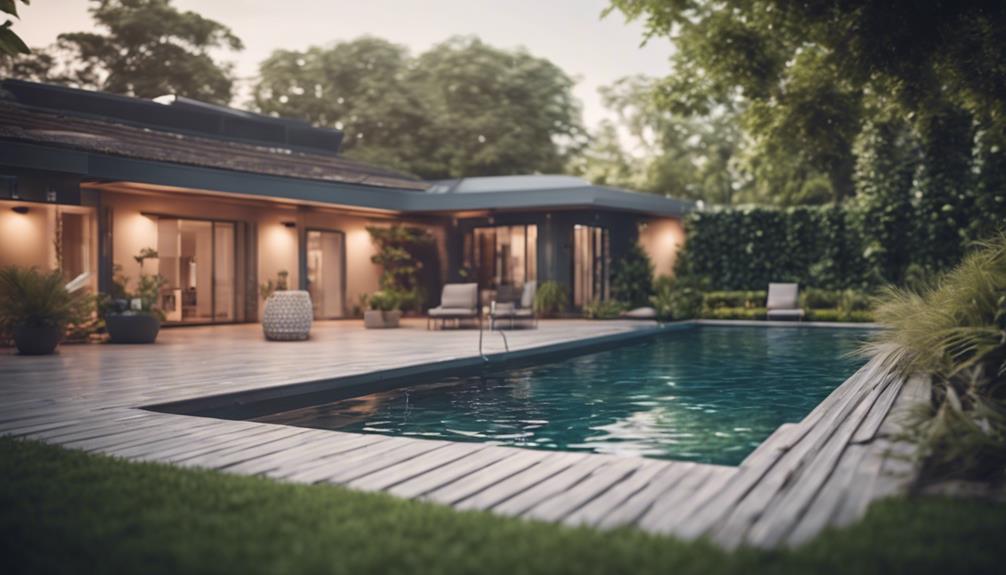
Variable-speed pumps offer significant benefits for your eco-friendly swimming pool. By saving up to 55% of energy costs compared to traditional pumps, they provide a cost-effective solution for energy efficiency.
Additionally, their capacity to operate at different speeds guarantees efficient energy consumption, making them essential for reducing environmental impact.
Energy-Efficient Pump Design
Consider upgrading to a variable-speed pump for your swimming pool to greatly reduce energy costs while maintaining efficient water circulation. Variable-speed pumps are designed to adjust their speed according to the required flow rates, saving energy – up to 55% compared to traditional pumps.
Two-speed pumps also offer energy-saving benefits by allowing you to choose between full-speed operation for high-demand times and half-speed for more efficient circulation. Additionally, utilizing pump timers can help optimize your pump's energy usage by scheduling operation times, ensuring your pool stays clean while minimizing unnecessary energy consumption.
When it comes to energy-efficient pump design, selecting the right pump is essential in maximizing energy conservation in your pool. By investing in these advanced pump technologies and practices, you can't only save on energy costs but also contribute to a more eco-friendly pool system.
Cost Savings Potential
To highlight the potential cost savings of variable speed pumps, it's important to grasp the significant energy efficiency benefits they offer compared to traditional pump models. Variable speed pumps can save up to 55% of energy costs, making them a wise choice for your swimming pool.
By providing two-speed options, these pumps guarantee efficient circulation, ultimately reducing utility bills in the long run. Operating on a timer, variable speed pumps optimize cleaning cycles while conserving energy, contributing to substantial cost savings over time.
When selecting a pump, it's vital to take into account your pool's specific needs to maximize both cost savings and energy efficiency. By investing in a variable speed pump, you not only save on energy costs but also contribute to a more environmentally friendly pool system.
Make a choice that benefits both your wallet and the planet by opting for the efficiency and cost savings potential of variable speed pumps.
Environmental Impact Reduction
Maximize your pool's energy efficiency and reduce its environmental impact with the benefits of variable speed pumps. These pumps are designed to save energy and promote sustainability by operating at different speeds based on your pool's needs.
Here are three key advantages of using variable speed pumps:
- Energy Savings: Variable speed pumps can save up to 55% of energy costs compared to traditional pumps. By adjusting the speed based on demand, they use the least amount of energy necessary for water circulation, ultimately reducing overall energy consumption.
- Customizable Speed Options: With two speed settings available – 3,450 rpm for full-speed and 1,725 rpm for half-speed – variable speed pumps offer flexibility in managing your pool's circulation requirements efficiently.
- Timer Functionality: By running on a timer, variable speed pumps guarantee that your pool stays clean and well-maintained while conserving energy. This feature allows for efficient cleaning schedules without unnecessary energy consumption.
Choose a variable speed pump to make a significant impact on reducing your pool's environmental footprint and energy usage.
Solar Heating Solutions for Pools
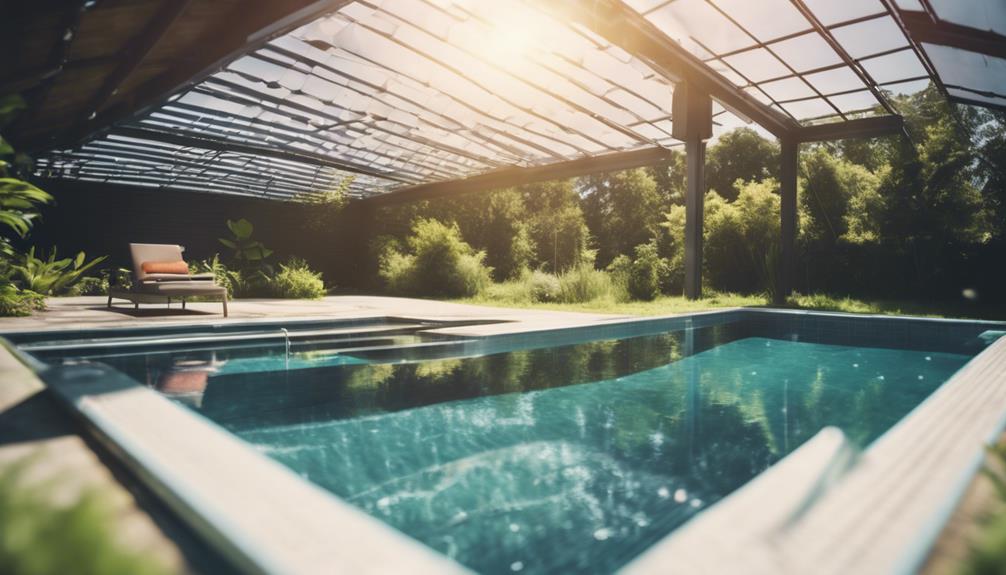
How can solar heating solutions revolutionize the way you heat your pool while saving you money and benefiting the environment?
Solar heating for pools is a game-changer when it comes to pool heating. By harnessing the sun's energy through solar panels, you can enjoy a warm pool while being environmentally friendly and reducing energy costs. These systems aren't only sustainable but also have a zero carbon footprint, making them a cost-effective long-term solution.
Installing solar heating for your pool is a straightforward process that requires minimal maintenance, giving you peace of mind. By opting for solar heating solutions, you can lessen your dependence on traditional energy sources for pool heating, contributing to a greener future.
Embracing solar heating is a smart choice that not only benefits your wallet but also helps protect the planet for generations to come.
Saltwater Pools and Wetland Systems

Harnessing the power of natural processes, both saltwater pools and wetland systems offer eco-friendly alternatives when contemplating pool setups. Here are three key points to ponder:
- Saltwater pools: These pools use salt to generate chlorine, reducing the reliance on harsh chemicals typically found in traditional pools. This chlorine reduction not only makes the pool more environmentally friendly but also minimizes skin and eye irritation for swimmers.
- Wetland systems: By mimicking natural filtration through the use of plants and soils, wetland systems provide sustainable ways to filter pool water. These systems promote ecological balance and sustainability by relying on natural processes rather than chemical interventions.
- Overall eco-friendliness: Both saltwater pools and wetland systems contribute to creating environmentally friendly pool environments. While saltwater pools require regular water testing to maintain chemical balance, wetland systems offer a more sustainable approach to pool filtration, aligning with a greener lifestyle.
Creating Eco Zones in Pools

Utilizing natural filtration systems like plants and microorganisms, eco zones in pools offer a chemical-free way to maintain water cleanliness and sustainability. These eco-friendly zones mimic natural ecosystems, reducing the need for harsh chemicals and traditional pool maintenance. By incorporating biological filters and energy-efficient circulation systems, eco zones promote a sustainable pool environment while ensuring safety and cleanliness for swimmers.
| Benefits of Eco Zones in Pools | |
|---|---|
| 1. Chemical-free maintenance | Eco zones eliminate the need for harsh chemicals, promoting a natural and eco-friendly approach to pool filtration. |
| 2. Mimicking natural ecosystems | These zones replicate natural ecosystems, enhancing sustainability and reducing the environmental impact of pool maintenance. |
| 3. Nutrient extraction | Aquatic plants in regeneration zones extract nutrients from the water, contributing to a clean and balanced pool environment. |
| 4. Enhanced filtration process | Energy-efficient pipes circulate water effectively, breaking down impurities and improving the overall filtration process. |
Incorporating Plants for Pool Sustainability

Incorporating plants in pool design enhances sustainability by utilizing natural filtration systems to maintain water quality without the need for chemicals.
Aquatic plants play an essential role in natural pools, acting as biological filters that help remove impurities and nutrients from the water, thereby promoting a healthier swimming environment.
Plant-based regeneration zones within these pools mimic natural ecosystems, facilitating efficient water purification processes.
By relying on plants for filtration, natural pools greatly reduce the dependence on traditional pool chemicals, benefiting both the surrounding environment and the swimmers enjoying the pool.
Not only do these plant-filled pools offer improved water quality, but they also add a visually appealing touch to the overall pool ambiance, creating a harmonious blend of nature and recreation.
Embracing plant integration in pool sustainability practices not only enhances the swimming experience but also contributes positively to environmental conservation efforts.
Frequently Asked Questions
Are Swimming Pools Eco-Friendly?
Yes, swimming pools can be eco-friendly. Practices like using pool covers, energy-efficient pumps, saltwater instead of chlorine, LED lighting, and eco-friendly cleaning products help reduce environmental impact. Consider these options for a greener choice.
Is It Safe to Swim in a Green Algae Pool?
Diving into a green algae pool isn't safe. Harmful bacteria lurk, causing skin irritations, eye redness, and respiratory woes. Keep pools crystal clear with adequate maintenance. Don't risk it; guarantee a safe swim!
What Is the Best Algae Killer for Pools?
For pools, the best algae killer is a copper-based algaecide. It effectively eliminates algae while being eco-friendly. Consider natural options like enzymes or ultrasonic controllers to maintain a clean pool without harsh chemicals. Regular maintenance helps prevent algae growth.
Can I Put Chlorine in a Green Pool?
You can put chlorine in a green pool, but it goes against the eco-friendly approach. Opt for natural filtration systems with plants and microorganisms instead. This choice maintains a chemical-free environment, providing a healthier swimming experience.
Are Trending Swimming Pool Colors Also Eco-Friendly Choices?
Looking to revamp your pool? Consider popular swimming pool colors like aqua, turquoise, and seafoam green. These trendy options not only add a stylish touch to your pool but can also be eco-friendly choices. Many modern pool paints and liners are designed to be environmentally friendly, ensuring a sustainable upgrade.
What Makes Outdoor Swimming Pools More Eco-Friendly Than Indoor Pools?
Outdoor swimming pool ideas can be more eco-friendly than indoor pools for several reasons. Outdoor pools require less energy for heating and lighting due to natural sunlight. Additionally, outdoor pools can be designed to incorporate natural filtration systems, reducing the need for energy-intensive chemical treatments.
What are the Most Eco-Friendly Swimming Pool Liner Choices?
When it comes to eco-friendly options, the most popular pool liners are made from materials like recycled vinyl and ethylene propylene diene monomer (EPDM). These liners have minimal impact on the environment and can be a great choice for a sustainable swimming pool.
Conclusion
To sum up, when it comes to eco-friendly swimming pools, there are plenty of options to choose from. Whether you choose high-tech solutions, natural bio pools, or sustainable construction methods, there are ways to make a splash while being kind to the environment.
Remember, every little bit helps, so don't hesitate to immerse yourself in the world of green choices for your pool. After all, a sustainable pool isn't just a drop in the ocean, but a ripple effect for a greener future.

